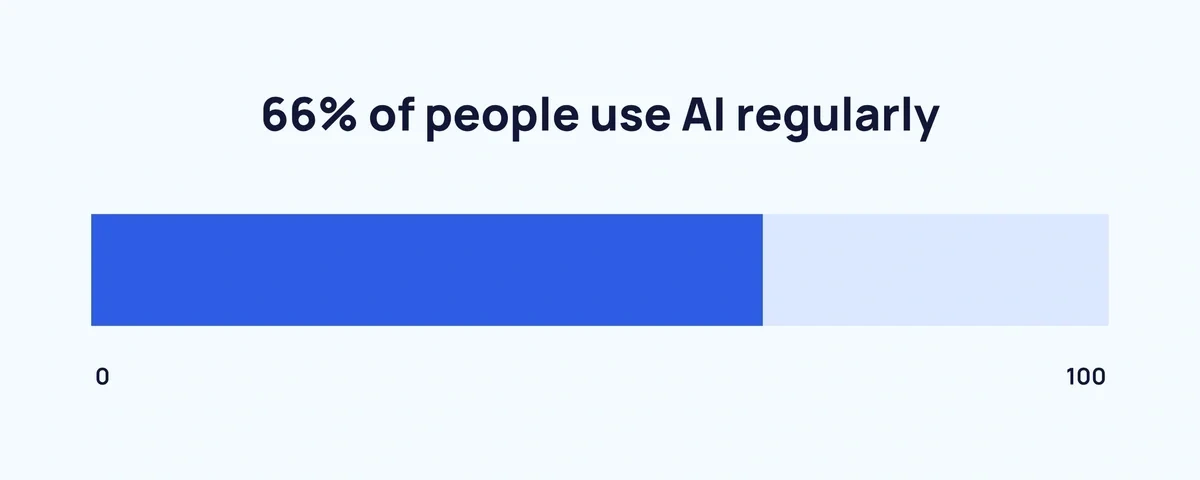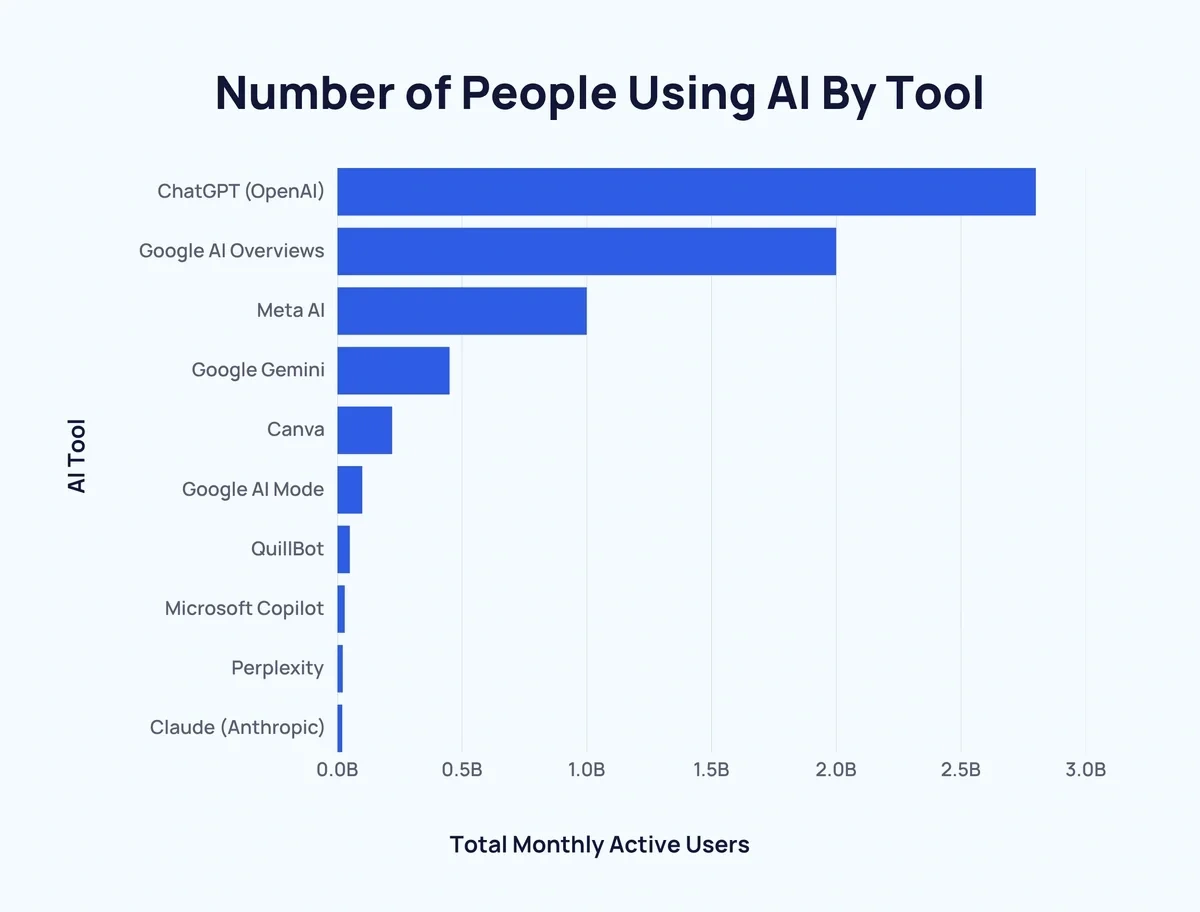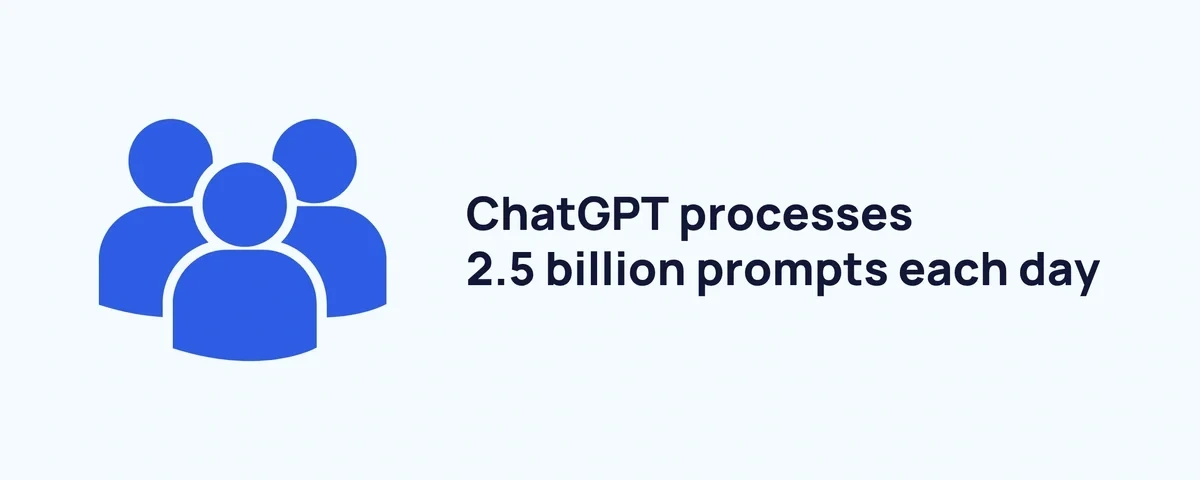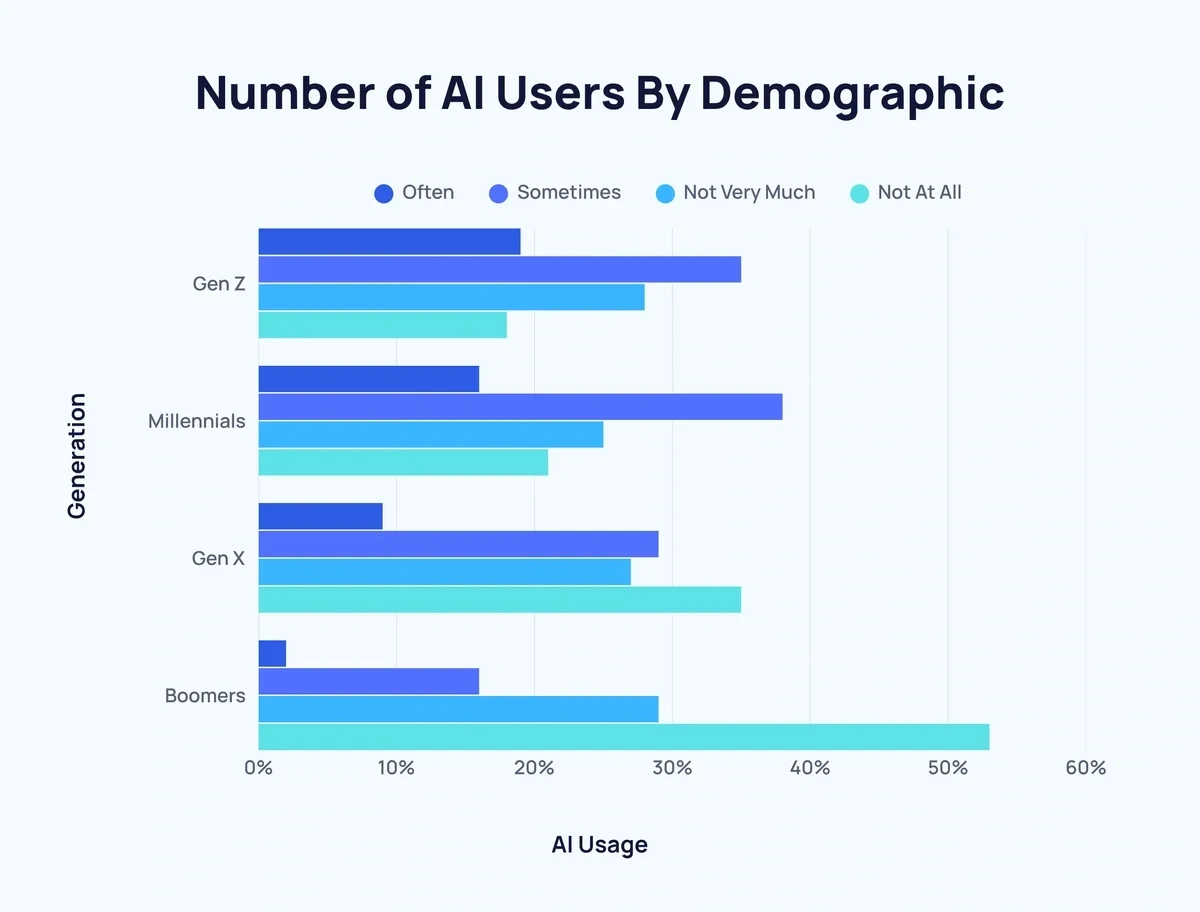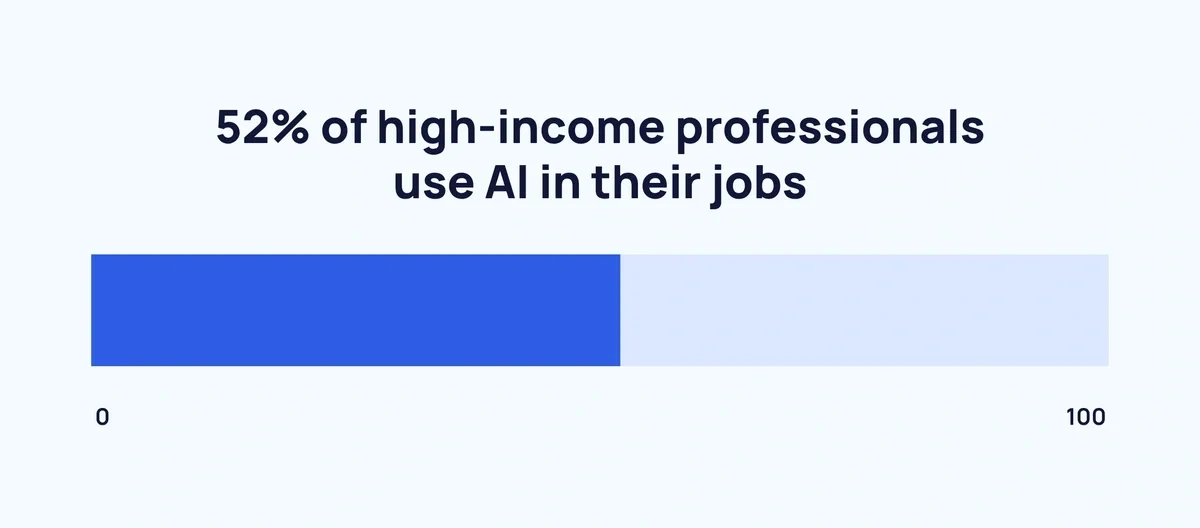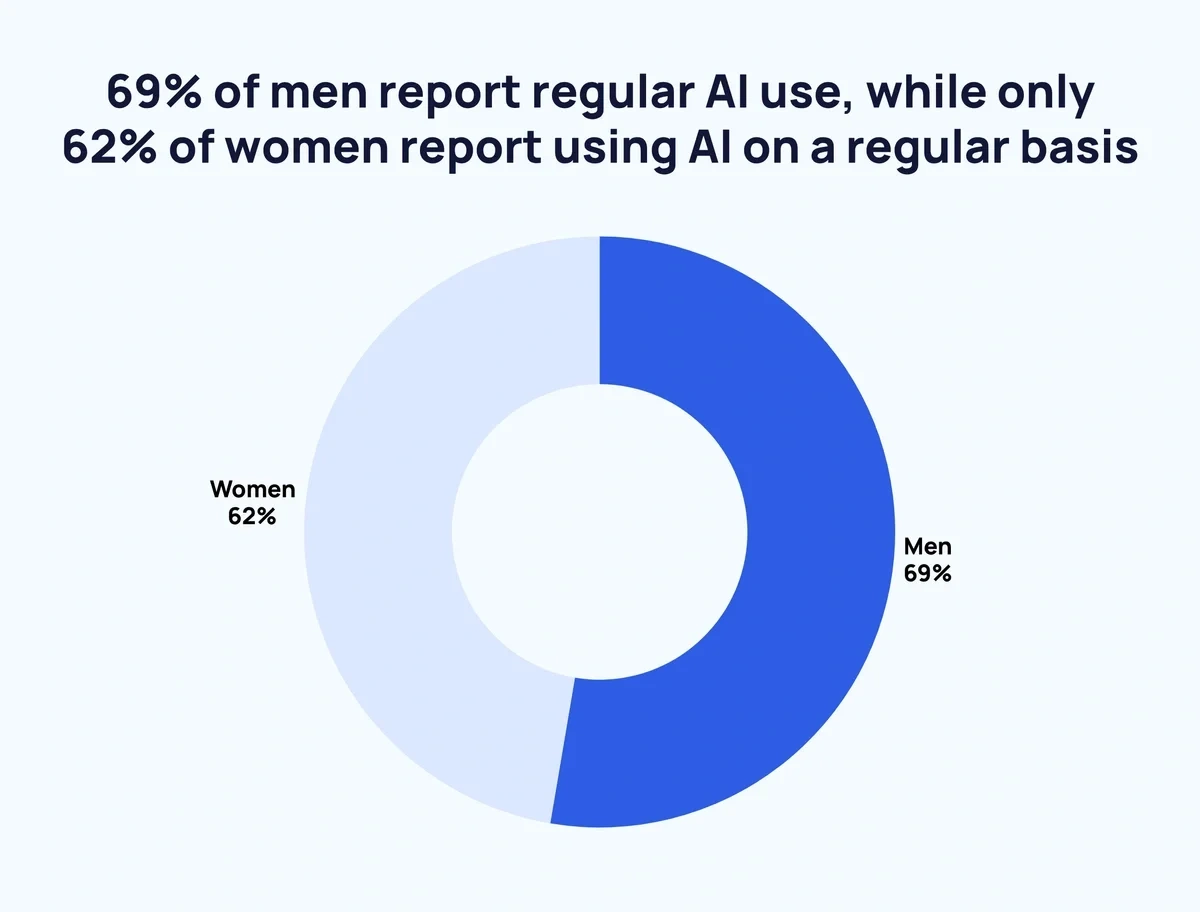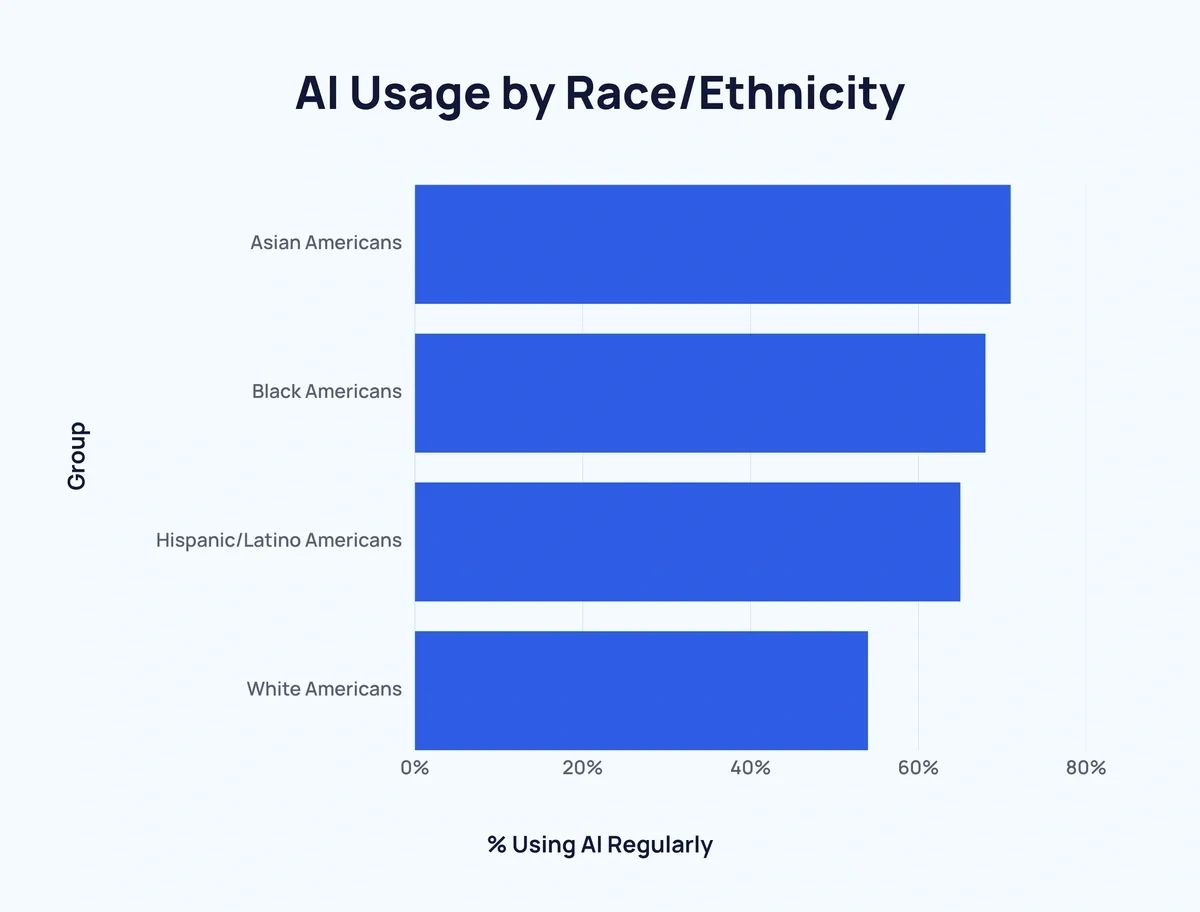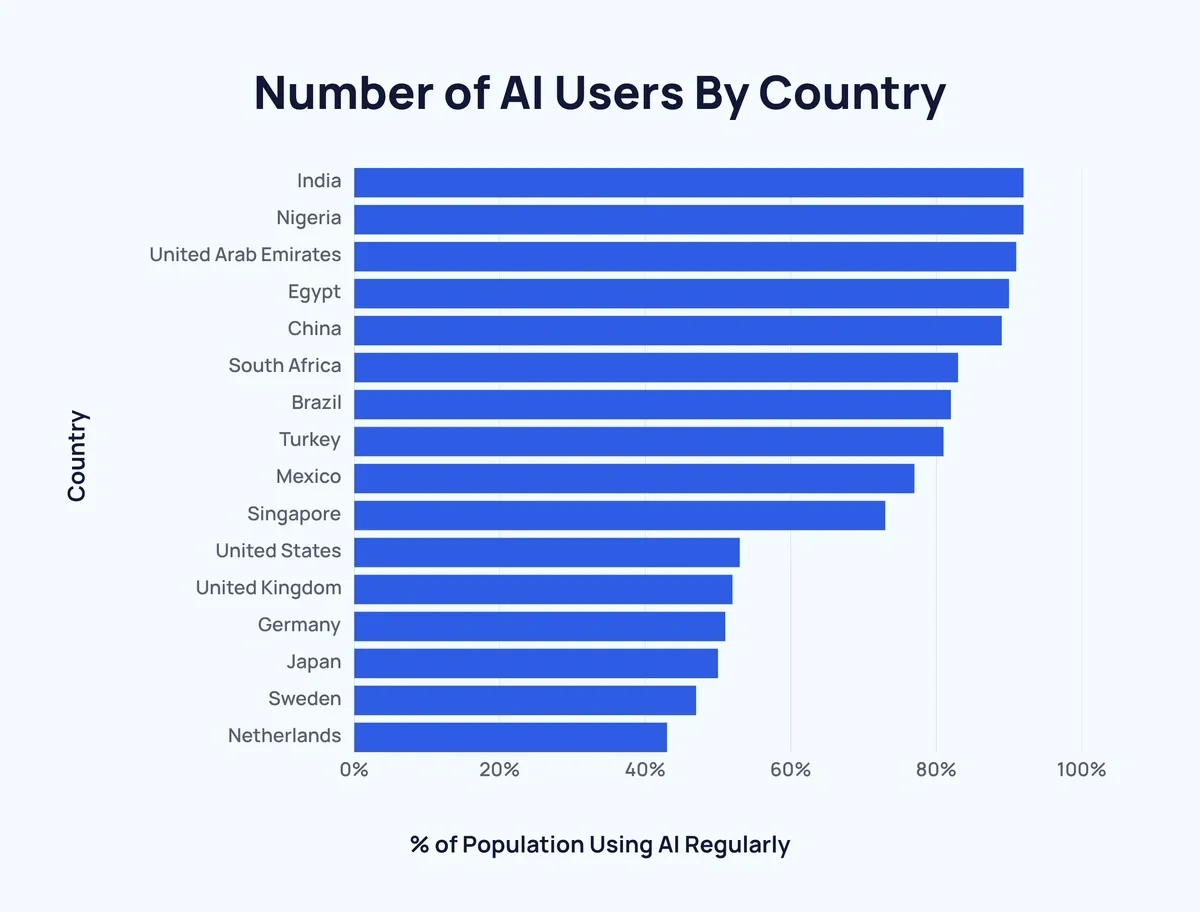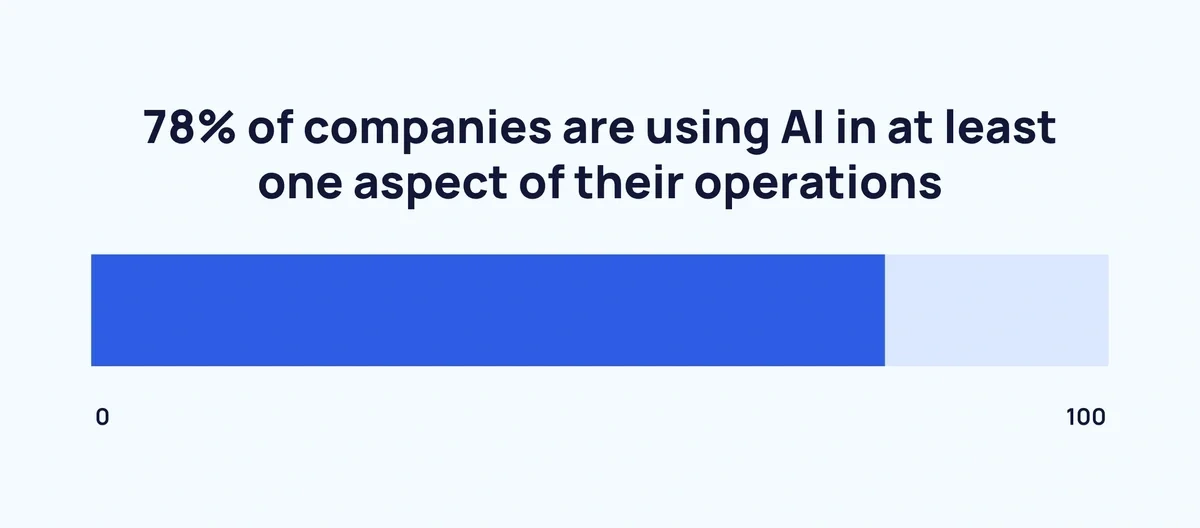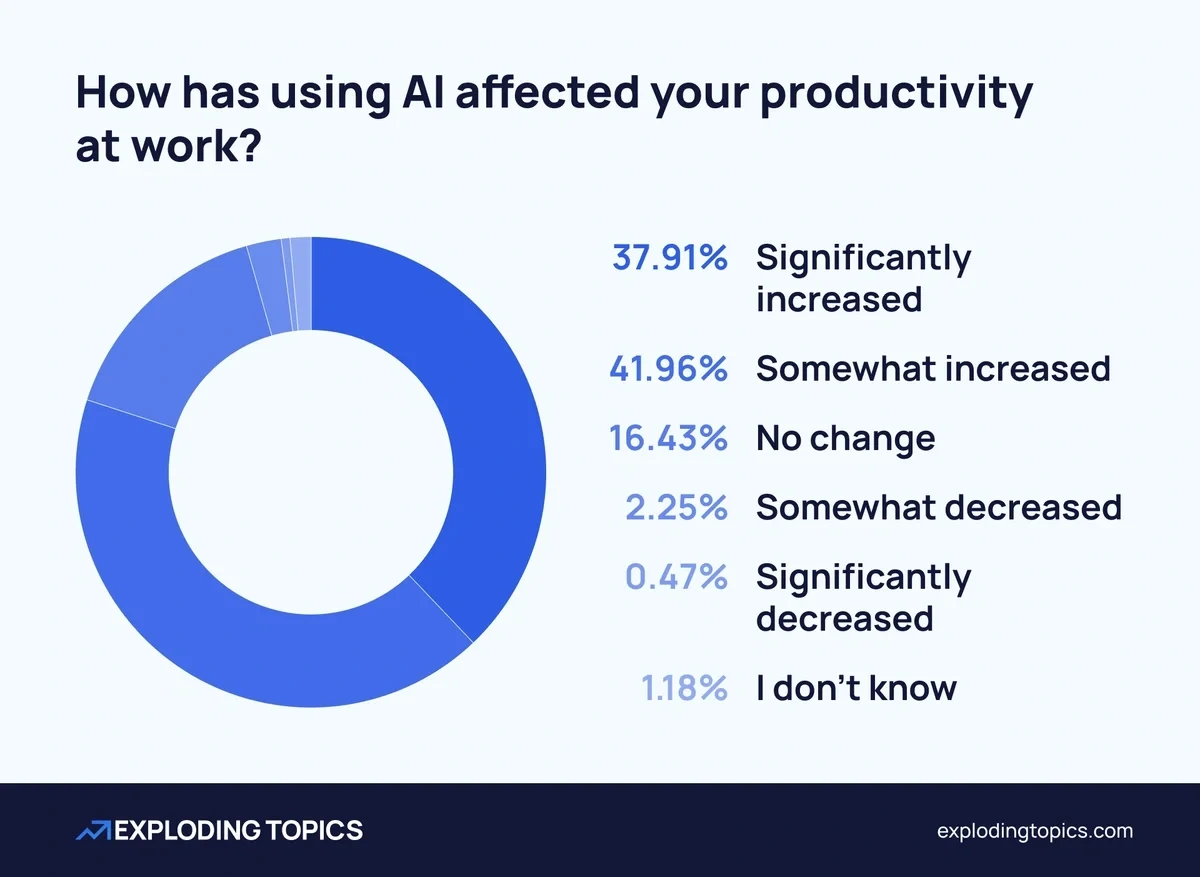Get Advanced Insights on Any Topic
Discover Trends 12+ Months Before Everyone Else
How We Find Trends Before They Take Off
Exploding Topics’ advanced algorithm monitors millions of unstructured data points to spot trends early on.

Keyword Research
Performance Tracking
Competitor Intelligence
Fix Your Site’s SEO Issues in 30 Seconds
Find technical issues blocking search visibility. Get prioritized, actionable fixes in seconds.
Powered by data from
How Many People Use AI? (Latest 2025 Data)
AI has been around longer than most realize, but consumer AI is a much newer trend.
Today, over 65% of people use AI on a regular basis.
This number has rapidly increased over the past few years due to the launch of generative AI tools like ChatGPT, Claude, and Perplexity, which have brought AI directly into people’s daily lives. Now, anyone can interact with AI in a natural, conversational way for work, education, or entertainment.
In this article, we’ll explore the latest 2025 data on AI usage and adoption, including how many people use AI, how often they’re using it, and more.
Key Takeaways
- 66% of people currently use AI on a regular basis.
- Nearly 1.8 billion people worldwide have used AI tools, with 500–600 million engaging daily.
- 78% of organizations use AI in at least one business function.
- AI adoption is highest in emerging markets, with India and Nigeria at 92% regular usage.
Get More Search Traffic
Use trending keywords to create content your audience craves.
What Percentage Of People Use AI in 2025?
More than half of the world’s population is now using consumer AI in some form, and adoption has surged over the past few years.
According to the latest 2025 data, 66% of people use AI regularly (intentionally at least every few months).
In comparison, only 61% of Americans have used AI in the past six months. That figure drops to only 19% of Americans when looking at daily AI use.
An estimated 1.7 to 1.8 billion people worldwide – roughly 20% of humanity – have used AI tools, with 500–600 million engaging daily.
Surprisingly, the United States is falling behind other countries in terms of AI adoption among its general population.
To dig into this further, Exploding Topics conducted a study to find out how many people are using AI today and in what ways they’re using it.
After surveying over 1,000 AI users, we discovered that 35.49% of respondents use AI daily.
Our survey also revealed that 79.94% of people use AI either in a personal or professional capacity. That means only 20.06% are not using AI at all in their daily lives.
Additionally, it’s estimated that 65% of companies use generative AI regularly.
Sources: KPMG, Semrush, Menlo Ventures
Number of People Using AI By Tool
ChatGPT is currently the most popular AI tool, with an estimated 700 million weekly active users. ChatGPT alone accounts for nearly 60% of all AI-related web traffic.
It’s also one of the most visited websites in the world. Semrush data indicates that ChatGPT generates 5.2 billion monthly visits from 651 million unique visitors.
The second most used AI tool is Meta AI, which has 1 billion monthly active users across Facebook, Instagram, and WhatsApp integrations. However, not all users are active Meta AI chatbot users since the company offers built-in access on its social platforms.
Other popular AI tools include Google Gemini (450 million monthly active users), Claude AI (20 million monthly active users), and Perplexity (22 million active users).
Below, we include the 10 most popular AI tools in 2025, based on active user numbers:
| Rank | AI Tool | Total Users (2025) |
| 1 | ChatGPT (OpenAI) | 2.8B monthly active users |
| 2 | Google AI Overviews | 2B monthly active users |
| 3 | Meta AI | 1B monthly active users |
| 4 | Google Gemini | 450M monthly active users |
| 5 | Canva | 220M monthly active users |
| 6 | Google AI Mode | 100M monthly active users |
| 7 | QuillBot | 50M monthly active users |
| 8 | Microsoft Copilot | 30M monthly active users |
| 9 | Perplexity | 22M monthly active users |
| 10 | Claude (Anthropic) | 20M monthly active users |
Sources: CNBC, Menlo Ventures, TechCrunch,
How Many People Use AI for Online Search?
Of those using AI, 83.27% use ChatGPT, making it the most popular AI tool among users.
Because of ChatGPT’s growth, it’s impacting how people use search engines like Google. According to recent surveys, 52% of adults now use AI large language models like ChatGPT for online search and other tasks, up significantly from prior years.
Although the adoption of LLMs for search-related tasks has surged, they continue to trail far behind established search giants like Google in terms of usage, search volume, and market dominance.
Based on Exploding Topics research, there are approximately 16.4 billion searches on Google every day.
Meanwhile, ChatGPT processes 2.5 billion prompts each day. And all of these are not search-related prompts.
It was estimated that ChatGPT received 37.5 million searches per day in 2024. That means in 2024, Google processed about 437 times more searches than ChatGPT.
Sources: Elon University
Number of AI Users By Demographic
Usage by Age Groups
Younger adults tend to be early adopters of new tech, and AI is no exception.
According to Barna’s data, Gen Z and Millennials are using AI in their personal lives the most. 19% of Gen Zers and 16% of Millennials say they use AI often.
Similarly, 35% of Gen Z and 38% of Millennials say they use AI sometimes. Only 18% of Gen Z and 21% of Millennials say they never use AI.
In contrast, 53% of Baby Boomers say they never use AI, while only 2% say they use AI often.
Below is a more detailed breakdown of AI usage by generation:
| Generation | Often | Sometimes | Not Very Much | Not At All |
| Gen Z | 19% | 35% | 28% | 18% |
| Millennials | 16% | 38% | 25% | 21% |
| Gen X | 9% | 29% | 27% | 35% |
| Boomers | 2% | 16% | 29% | 53% |
Usage by Income Level
AI adoption rises significantly with household income, as higher-income households are far more likely to use AI tools. This is largely due to greater access to paid subscriptions, workplace integrations, and higher digital literacy.
McKinsey data estimates for income range:
- Households earning $100,000+ annually: 72–74% use AI regularly
- Middle-income ($50,000–$100,000): 58% use AI regularly
- Lower-income (<$50,000): 41–53% use AI regularly
High-income professionals are far more likely to encounter AI in their day-to-day work. In fact, 52% of high-income professionals use AI in their jobs, compared to much lower rates among lower-income groups.
Here's the data:
| Income Level | % Using AI Regularly |
| $100,000+ | 72–74% |
| $50,000–$100,000 | 58% |
| <$50,000 | 41–53% |
Usage by Gender
Men use AI more than women, but the gap is narrowing as consumer AI tools become more mainstream.
69% of men report regular AI use, while only 62% of women report using AI on a regular basis.
Men tend to use AI more for professional and technical tasks such as coding, analytics, and workflow automation.
Women, on the other hand, lean toward productivity and lifestyle applications, including writing assistance, shopping recommendations, learning tools, and creative tasks.
Usage by Race/Ethnicity
In the United States, ethnic minorities use AI more than white individuals.
Asian Americans lead in AI awareness and professional use, as 71% report using AI regularly. In comparison, only 54% of white Americans use AI regularly in their daily lives.
Here’s a complete look at AI adoption by race/ethnicity:
| Group | % Using AI Regularly |
| Asian Americans | 71% |
| Black Americans | 68% |
| Hispanic/Latino Americans | 65% |
| White Americans | 54% |
Sources: Barna, McKinsey, Menlo Ventures
Number of AI Users By Country
The use of consumer AI varies significantly by country and region. Generally, emerging markets lead in AI usage rates, while some advanced economies are lagging behind.
According to KPMG's global study, which covered 47 countries, India and Nigeria have the highest reported AI usage – about 92% of people in each country use AI on at least a semi-regular basis.
Other emerging economies, such as the United Arab Emirates, Egypt, and China, show very high adoption rates above 85%.
Below is a more detailed look at the AI usage rates by country:
| Country | % of Population Using AI Regularly |
| India | 92% |
| Nigeria | 92% |
| United Arab Emirates | 91% |
| Egypt | 90% |
| China | 89% |
| South Africa | 83% |
| Brazil | 82% |
| Turkey | 81% |
| Mexico | 77% |
| Singapore | 73% |
| United States | 53% |
| United Kingdom | 52% |
| Germany | 51% |
| Japan | 50% |
| Sweden | 47% |
| Netherlands | 43% |
Sources: KPMG
Build a winning strategy
Get a complete view of your competitors to anticipate trends and lead your market
Number of Companies Using AI
Based on the latest 2025 data, 78% of companies are using AI in at least one aspect of their operations.
Additionally, 92% of companies anticipate increasing their investment in AI over the next three years. The data shows that over 90% of companies are currently exploring AI or already using it within their organization.
In comparison, only 20% of companies were using AI in daily business operations or within their products in 2017.
Many of the people using AI in their personal lives are also using AI at their company. Survey data revealed that 83.13% of the people who use AI are also using it at work.
The use of AI has also positively impacted companies. 79.67% of people who use AI say it has improved their productivity in some way.
Sources: McKinsey, IBM, McKinsey
What Does the Future of AI Look Like?
AI has quickly become a daily topic of conversation for many people, even those with non-technical backgrounds.
In 2025, two-thirds of the global population now engage with AI regularly, and usage is only growing in every demographic, income group, and region.
Analysts project that by 2030, 80–85% of the world’s population will use AI tools, with most interactions happening seamlessly through apps, devices, and personal assistants.
Much like the internet or smartphones, AI is on track to become a foundational technology that people rely on without even thinking about it.
Stop Guessing, Start Growing 🚀
Use real-time topic data to create content that resonates and brings results.
Exploding Topics is owned by Semrush. Our mission is to provide accurate data and expert insights on emerging trends. Unless otherwise noted, this page’s content was written by either an employee or a paid contractor of Semrush Inc.
Share
Newsletter Signup
By clicking “Subscribe” you agree to Semrush Privacy Policy and consent to Semrush using your contact data for newsletter purposes
Written By


Anthony is a Content Writer at Exploding Topics. Before joining the team, Anthony spent over four years managing content strat... Read more




